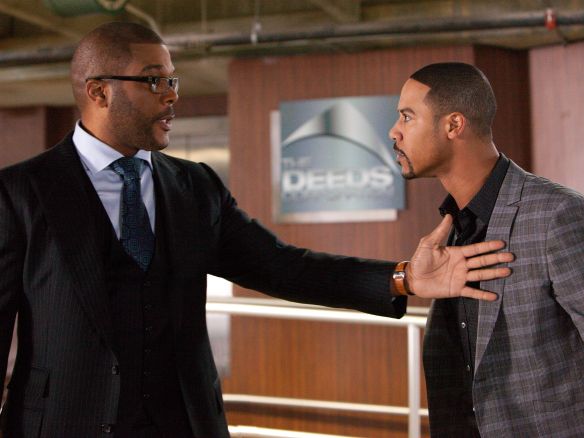
Tyler Perry's Good Deeds shows that the highly successful, critically derided multi-hyphenate learned a little something from his rather ambitious 2010 drama For Colored Girls. He more or less abandons any comedy at all this time around, and while that means that Good Deeds doesn't suffer from the manic-depressive mood swings that typify many of his films, it also showcases all the more glaringly just how rudimentary his dramatic chops are.
Perry himself stars as Wesley Deeds, the CEO of a successful software company founded by his father. His younger brother Walter (Brian J. White) is a quick-tempered alcoholic who believes their father wanted him, not Wesley, to run the company. Their mother Wilimena (Phylicia Rashad) forever chastises Walter for not being more like Wesley, especially since Walter can't settle down while Wesley is engaged to the beautiful Natalie (Gabrielle Union). Although Wesley's life seems perfect, he tells us in an opening voice-over that he's miserable; he's living a life other people want him to live, not the one he wants.

He begins to crawl out of his self-imposed funk when he meets Lindsey Wakefield (Thandie Newton), a single mother who has hit rock bottom. She's homeless, living out of her minivan, unable to get her child to school on time, and too proud to accept help from anyone. That is, until one night when Wesley sees her and her daughter sitting in what he believes is a broken-down vehicle. He buys them both pizza, and so begins a friendship that changes Lindsey and Wesley forever.
What hampers the film at every turn is Perry's rudimentary writing. There's no subtext in the movie because everybody states out loud exactly what they think and feel in simplistic, completely literal terms, even if they're only speaking to us in voice-over. Perry doesn't have the patience to establish Wesley's unhappiness through filmmaking and he'd rather just tell us up front; as a result, he has more time to wallow in the squalor of Lindsey's life, since Perry firmly believes that hardship builds character and we need incessant reminders that she and her daughter are dealing with constant financial and physical threats. Either he's an unsophisticated writer, or he lacks any faith that an audience could understand anything that isn't laid out right in front of them.

The actors are all directed to make the emotions of almost every scene fill up not just the screen, or even the whole theater, but the entire multiplex -- Perry's melodramatic streak is always on display. He begs for us to engage with the film by showing his characters in constant tumult. The only problem is he doesn't build up to that dramatic tension, he just cranks up the hysterics and hammers on our tear ducts for two hours.
There are, however, a handful of exceptions in the picture, and they do stand out. The next-to-last scene between Wesley and Natalie, in which they are finally truthful with each other, is actually a gentle, difficult conversation between discontented lovers. While the scene's not particularly memorable, and we've seen moments like this hundreds of times before, it does show that somewhere in Perry lies the spirit of an artist. The trouble is that this spirit is overshadowed so often by his need to be a showman, to overwhelm us with heightened melodrama. That need manifests itself clearly in Perry's ridiculous decision to score the last five minutes of Good Deeds to Richard Marx's unrelentingly sappy "Right Here Waiting," which is played in its entirety.
It would be nice if Good Deeds were autobiographical, if Perry, like his protagonist, was sick of his present career path and wanted to try something boldly different -- like trusting his audience. However, he seems happy to crank out pretty much the same movie over and over, so that seems unlikely. Maybe he thinks "Right Here Waiting" is being sung to him by his fans.
